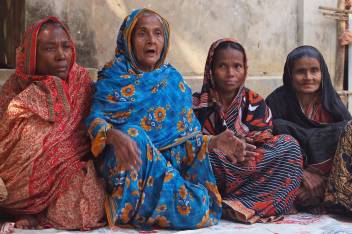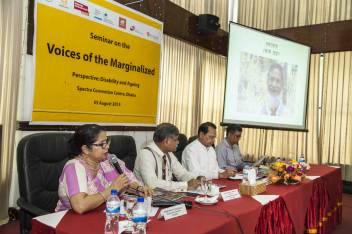A set of recommendations to improve the lives of older people and people with disabilities were discussed in front of key policy makers in Dhaka, Bangladesh on 5 August. More than 150 people were there to learn directly from this marginalised group.
Bangladesh’s excluded
Globally, people with disabilities face widespread exclusion, and it is no different in Bangladesh.
They are routinely left out from participating in social, economic and political activities and processes, including international development policy, practice and research.
This exclusion ensures they are ignored during decisionmaking processes and reinforces the disproportionately high number of people living with disabilities among the poorest of the poor.
 Global ageing has a major influence on disability trends. There is a higher risk of disability at older ages. Meanwhile, age-related health problems that can affect sight, hearing, mobility and mental functioning mean older people are particularly vulnerable to the poverty-related effects of disability.
Global ageing has a major influence on disability trends. There is a higher risk of disability at older ages. Meanwhile, age-related health problems that can affect sight, hearing, mobility and mental functioning mean older people are particularly vulnerable to the poverty-related effects of disability.
Bangladesh is the world’s seventh most populous country in the world, and one experiencing rapid demographic change. Its population is ageing at an unprecedented rate, and more of those who reach the age of 60 are now expected to live to 75 or beyond.
Ensuring voices are heard
It is imperative to bring the perspectives of older people and those with disabilities into post-2015 policymaking to prevent these vulnerable groups from being left behind.
HelpAge International, Sightsavers, ADD International and Alzheimer’s Disease International have pushed for this through a collaboration with the Institute of Development Studies for the study We can also make change.
The research, which first launched in 2012, aimed to better understand the experiences of people in Bangladesh who endure social, political and economic exclusion due to being older or because of their disabilities, but specifically from their perspective. Although the facts of exclusion are widely documented, the reality is less understood.
Several recommendations to improve the wellbeing of older people and those with disabilities were made as a result of the research. They relate to 12 separate areas, including livelihood, accidents and disasters, health services and family support.
 These findings were shared with policymakers and media through a national seminar in Dhaka entitled Voices of the Marginalized on 5 August.
These findings were shared with policymakers and media through a national seminar in Dhaka entitled Voices of the Marginalized on 5 August.
Hasanul haq Inu MP, Minister of Ministry of Information, attended as chief guest and declared that the government is planning to enact an anti-discrimination law to protect marginalised communities. He also urged the media to raise awareness among the public regarding the rights of marginalised people.
Change is inevitable
One of the respondents of the study, 66-year-old Dewan, said in the report: “I’m living like a nest-less bird. I have debt. I have to survive by begging. I live on government land.”
We hope our policy makers will be more responsive to ensure a discrimination-free society for older people and people with disabilities, allowing them to settle in their own nest and fly freely when they choose.
Find out about our ADCAP programme, which aims to ensure humanitarian responses are inclusive of older people and people with disabilities.
